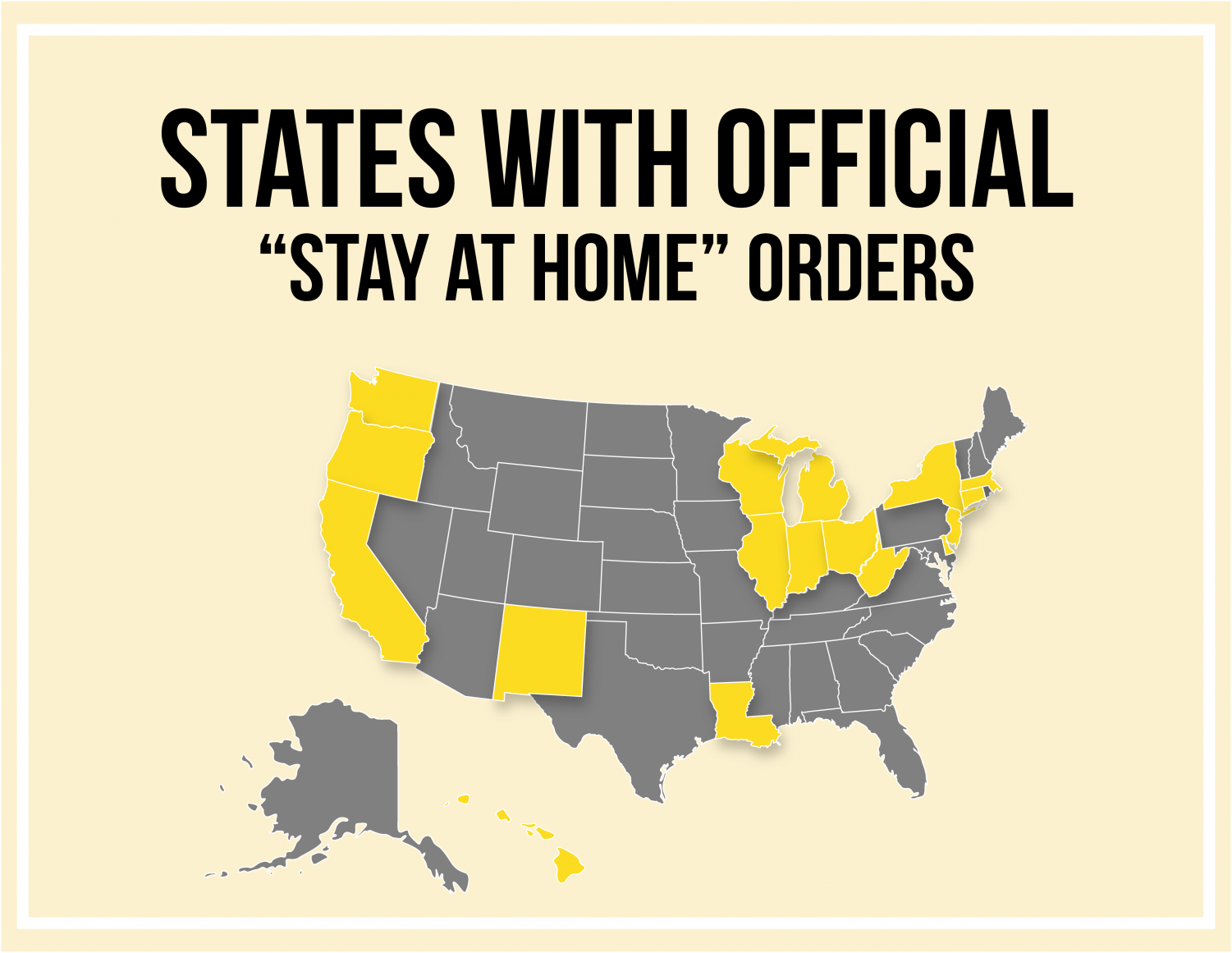Your guide to ‘stay at home’ orders
March 25, 2020
Mecklenburg County was the fourth North Carolina community to issue a “stay at home” order, effective Thursday morning. The county, which includes Charlotte, was soon followed by Durham, Winston-Salem and similar rules in Guilford County. Madison County, Pitt County and the Town of Beaufort already have orders in place.

As of March 24, 16 states have statewide “stay in place” orders, and the number is expected to rise. If North Carolina or Watauga County issues a “stay in place” mandate, this could mean a variety of things for residents.
Each state has slight variations for their requirements, but they all generally ask residents to stay in their homes as much as possible, close non-essential businesses, cancel unnecessary travel and refrain from gathering in groups larger than 10 or visiting other people’s homes.
Earlier this week, Director of the National Institute of Allergy and Infectious Diseases Anthony Fauci said he supported stay in place orders during an interview with Mark Zuckerberg on Facebook.
“We now are still in the escalation phase,” Fauci said. “How high that gets and how long it’s going to take to turn around is going to depend on how well we do containment and mitigation.”
FAQs
Which states have statewide “stay at home” orders in place?
As of March 24, 16 states have these orders in place. They are California, Connecticut, Delaware, Hawaii, Illinois, Indiana, Louisiana, Michigan, New Jersey, New Mexico, New York, Ohio, Oregon, West Virginia, Wisconsin and Washington. Several states have limited nonessential businesses, and multiple counties and cities have given their own “stay at home” orders.
How long will this be in place?
Many governors who have issued these plans stated the orders would be “effective until further notice,” but others put them in effect for 30 days with the option to terminate or extend the orders. Fauci said it is “very difficult to predict” how long “stay at home” will last.
Which businesses will remain open?
Only businesses and nonprofits deemed essential will remain open. This means hospitals, grocery stores, pharmacies, post offices, banks, gas stations, some transportation and the occasional pet store will stay open. Other things like news organizations, local governments and education will operate at a distance over video, phone and online communications.
Businesses and organizations that pertain to the safety, sanitation and health of the population will be open. Individual governors make their own requirements on the specifics of things like take-out and delivery food services and homeless shelters.
What about caregivers?
Caregivers are considered essential healthcare employees and will still be able to serve their clients.
Will residents who are elderly and live alone be able to receive help?
Healthy family and friends can still deliver medication and food to their family members who may be confined to their home. The Centers for Disease Control and Prevention has advised those over 60 and those with severe chronic medical conditions to stay in their homes. If the state allows, there are also food delivery services available to these residents.
If my work requires me to leave my home, can I still work?
If you work for an essential business (as defined by the state), you can go to work. Jobs such as waste management, water and electric facilities, public safety, and food and medical delivery are considered essential. Otherwise, you must have a permit to work outside your home.
What if I lose my job?
If eligible under new criteria, you can file for unemployment. The U.S. Department of Labor is permitting flexibility for states to amend unemployment laws to provide benefits related to COVID-19 in three cases: “An employer temporarily ceases operations due to COVID-19, preventing employees from coming to work; An individual is quarantined with the expectation of returning to work after the quarantine is over; and An individual leaves employment due to a risk of exposure or infection or to care for a family member.”
Will this affect when/if I can go to the grocery store or pharmacy?
You can still go to the grocery store during its set hours — some may have changed for cleaning and restocking purposes — but it is highly suggested to make as few trips as possible during the “stay at home” period.
Can I exercise outside?
Yes, you can go on walks, runs and to parks, but you must practice social distancing while doing so (remain 6 feet apart). Playgrounds are typically not open during this time.
What happens if I don’t follow orders?
In Mecklenburg County, violation can result in a Class 2 misdemeanor. In some places, violation can result in fines and jail time. The governor has the power to enforce these laws.
How will they know if I leave?
In Italy and China, where “stay at home” has been utilized with more aggression, roadblocks were put in place to prevent people from traveling too far from home without a permit, but it is unclear how states will enforce policies at this time.











